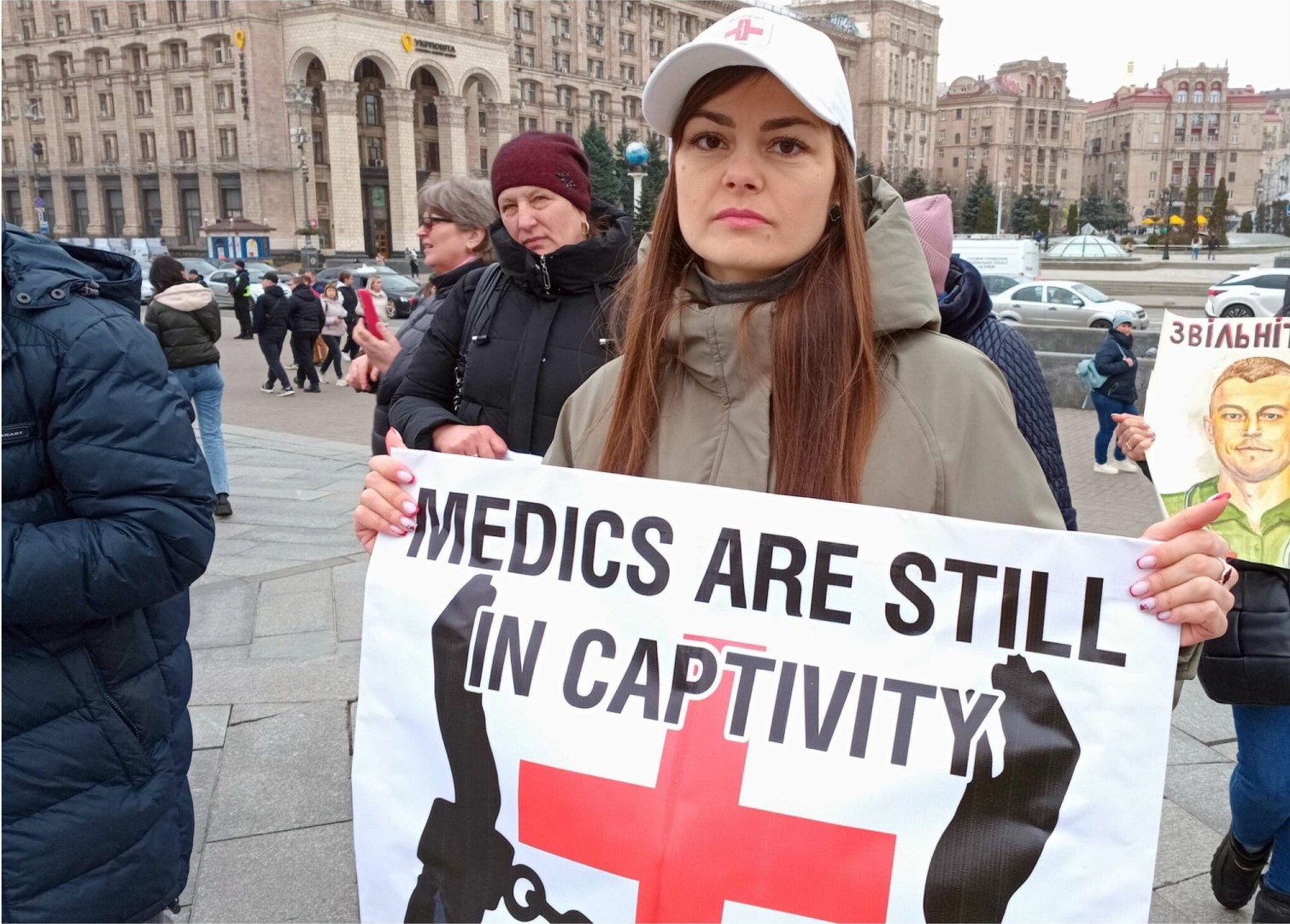Viktor Ivchuk saved hundreds of lives in occupied Mariupol for which Russia has held him prisoner for over two years

43-year-old Viktor Ivchuk was taken prisoner by the Russians on 12 April 2022, the day after a presidential decree declaring him to be a Hero of Ukraine. Ivchuk, a colonel of the Ukrainian Armed Forces Military Service, was Director of Military Hospital No. 555 in Mariupol when Russia began its full-scale invasion of Ukraine in February 2022. Under his leadership, the medical personnel continued, despite constant Russian attack, to treat and, very often to save the lives of, hundreds of wounded civilians and Ukrainian defenders. A Russian airstrike on the hospital on 15 March 2022 meant that the staff and patients needed to be evacuated. Half were taken to the Azovstal Steelworks, half to the Illich Steel and Iron Works, with Ivchuk accompanying the latter. He was among around 100 medical personnel whom the Russians took prisoner on 12 April 2022.
Hospitals are protected under international law unless they constitute military targets. No number of wounded military personnel would give Russia the right to consider the hospital where they were being treated, along with hundreds of civilians, a legitimate ‘military objective’. All medical personnel, with this including those involved in the search for, collection, transportation, diagnosis, or treatment of the wounded or sick, have protected status under the 1949 Geneva Convention and the 1977 Additional Protocols to the Convention. If they fall into enemy hands, they should be released immediately, without any conditions.
These are the international commitments that Russia made and has brazenly flouted throughout its war of aggression against Ukraine. During the first 35 days of the full-scale invasion, Ukrainian healthcare infrastructure was attacked on a daily basis, and Russia has continued to target hospitals since then. As of December 2023, Russia was not only illegally holding up to 500 medics hostage, but was also preventing the International Committee of the Red Cross from seeing them and denying them any contact with their families. Viktoria Ivchuk, for example, last spoke with her husband from captivity back in September 2022. She has learned from hostages who have since been released in exchanges that he was held for over a year and a half in Belgorod oblast. He was, however, moved over four months ago, with no information as to where he was taken. The families of other medics seized on 12 April 2022, or, later, from Azovstal, have also heard nothing or almost nothing, with any information gleaned solely from former prisoners. The family of Andriy Shydlovsky (b. 1994) last heard from him on 12 April 2022, and only know that he is alive thanks to information from fellow hostages who have since been released. Not all are even military medics. Serhiy Doroshenko, for example, worked as a paediatrician in Mariupol before Russia’s full-scale invasion. He joined the Mariupol Territorial Defence on 24 February 2022 and was sent to serve as a doctor, at Hospital No. 555. Since he has been imprisoned since late May 2022, he was presumably among the medics who were moved to Azovstal after Russia bombed No. 555.
Since Russia is holding both civilian hostages and prisoners of war [POW] in appalling conditions and in the majority of cases applying torture, it is unlikely that imprisoned medics are receiving better treatment. In fact, Maria Klymyk from the Media Initiative for Human Rights told Graty that, since Russia does not want to admit to holding medics, it uses torture to try to force out some kind of fake ‘confessions’. In fact, the vast majority, if not all, of the ‘trials’ staged either of Ukrainian POWs or of abducted civilians are based solely on ‘confessions’ tortured out of people held totally incommunicado. This was, undoubtedly, the case on 13 February 2024, when an unrecognized ‘court’ in the Russian proxy ‘Donetsk people’s republic’ sentenced military medic Vladislav Liashuk and prisoners of war Andriy Kayirsky and Andriy Balykin to 28, 28 and 26 years’ imprisonment, respectively.
There are, however, occasions where the Russians use imprisoned medics to treat other Ukrainian hostages. This was the case with Yury Armash, who was released in an exchange of prisoners in April 2023. He was imprisoned in occupied Nova Kakhovka and was at least allowed to provide treatment to the invaders’ victims of torture, as well as the women prisoners, including at least one 14-year-old girl, whom the Russians raped. Armash experienced the torture at first hand, but was also brought in when the Russians had gone too far with their torture. The youngest of their victims was just 18, with Armash called in because the Russians had pulled the lad’s fingernails out and left him until he developed gangrene (more details here).
Klymyk points out that even after the almost certainly deliberate explosion at the Olenivka Prison on 29 July 2022 which killed over 50 Ukrainian prisoners of war, it was only imprisoned Ukrainian medics who provided any medical assistance.
The civic organization Military Medics originated from a Viber chat between families of medics seized and held prisoner by the Russians. Some of the medics first held have been released, although Marianna Mamonova was forced to spend six months of her pregnancy in captivity with the Russians only releasing her just before the birth of her baby daughter. Andriy Kryvtsov, the head of the organization’s board and brother of one of the women medics whom Russia did eventually free, says that government sources suggest that there are around 500 military or civilian medical personnel who are either in Russian captivity or have disappeared without trace.





